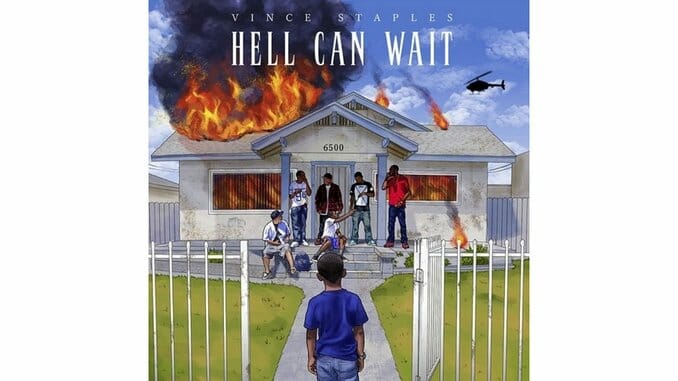
“School couldn’t get me into heaven/And heaven couldn’t get me in a bitch bed,” raps Long Beach rapper Vince Staples on “Fire,” the first song of his major-label debut. As deceptively simple as these lines are, in his typically oblique manner, Staples is actually making quite a mission statement. Shunning the deceitful simplicity of school as a path to grace and grace as a path to happiness, pleasure, Staples chooses to be a menace, throwing on a blue Yankees hat and embracing his ancestry: “a bloodline of crips.” Hell can wait because heaven, especially the heaven that he wants, is impossible given his circumstances. This kind of fatalism is not new to rap, but where many rappers have superficially used it to justify excessive celebration—“champagne for the pain”—Staples uses it to justify his attachment to being a menace.
Like a concealed weapon, this menacing persona has always lurked in the shadows of Vince’s music, but on Hell Can Wait, he openly brandishes it, referring to himself as “gangsta god” as he demands fellatio in the stone-faced, yet taunting chorus of “65 Hunnid,” a strange song that channels New Orleans jazz. This “open carry” use of menace is new territory for Vince, but it succeeds because he has a very distinct and uncompromising vision of what it means to be a gangster. As he cleverly declares on “Screen Door,” Bobby Johnson, the main character of South Central, is not his original gangster, his model of success. Rather, Vince’s father serves this role, using the screen door of their home as a concierge bell to sell narcotics. That said, Vince has no illusions about his role model, emphasizing that the same screen door that beckons junkies and feeds his family is eventually knocked on, then knocked down, by cops. Original gangsters can quickly become original felons.
Vince’s keen awareness of the inherent precariousness of gangster life is precisely what prevents his menacing gangster persona from becoming a caricature. As he militantly sets his sights on (crooked) cops and blue Jordan sneakers on “Hands Up” and “Blue Suede,” respectively, he notably refrains from becoming superhuman, à la Scarface. For instance, On “Blue Suede,” rapping over an instrumental that eerily blends G-funk, trap and Rob Zombie movie soundtracks, Staples chants, “Young graves get the bouquets/Hope I outlive them red roses.” Even as he condemns snitches, celebrates cocaine and shoots at police, Staples never deludes himself into thinking he’s above it all because that same Triple Entente could cause his downfall, especially the latter (“Hands Up”). To put it succinctly, even the gangsta god isn’t immune to bullets.
“Limos” is the EP’s only misstep. Though distrust and denigration of women have an unfortunate and lame precedent in gangster rap and in Staples’ past work (see “epaR” and “Taxi”), “Limos” is particularly egregious. In the song, Staples generically tells the story of women who “use their wombs to move forward.” Whereas all of the EP’s other songs rely on some element of personal experience to bolster their message, “Limos” rests on generic stilts of misogyny at worst and uncreativity at best. Perhaps Staples actually does have concrete experiences with gold-diggers and conniving women, but if so, they are buried beneath a vague and unclear fear of trusting others, namely listeners, in the way that love requires. Even a hardened menace needs motives, Vince.
In the end, despite its brevity—seven songs, 24 minutes—Hell Can Wait is a dense and rewarding EP from a rapper who is refreshingly serious about his craft. While it does not carve a new space for rap—this is gangster rap through and through—the EP does make the important insistence that gangster rap is a shallow and uninteresting subgenre only when it is populated by lazy, complacent rappers. Vince Staples is neither lazy nor complacent. This EP probably won’t move the YG and DJ Mustard crowd or offer the moral high ground of the Kendrick Lamar crowd, but if Vince Staples could survive the horrors of Long Beach, he definitely can survive cliquish and conservative rap fans.